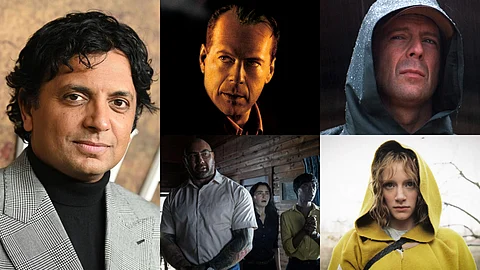

M Night Shyamalan is known for his trademark plot revelations in his films, but the filmmaker himself claims that not every film of his has the so-called 'twist'. Now, what is a plot twist? It is an element that brings a new angle to a story while surprising the audience, without any hint in the narrative to see it coming. An example is Darth Vader (James Earl Jones) telling Luke Skywalker (Mark Hamill) that he is the Jedi's father in The Empire Strikes Back. To use a Shyamalan film as an example, in Trap, Rachel (Alison Pill) setting her husband Cooper (Josh Hartnett) up for the police to catch him is a twist. The filmmaker's storytelling is so adept that even when one of his films does not have a twist, its climax can still feel like a shocking surprise to the audience. However, is every revelation in Shyamalan's filmography even a twist, to begin with? Or is it a careful culmination of a conceit? The Sixth Sense, for instance, gives hints to piece the puzzle together throughout the film. For example, notice how psychologist Malcolm Crowe (Bruce Willis) talks to his wife (Olivia Williams), but she does not talk back to him. She also appears sad the whole time, a subtle hint that something is amiss in their relationship. Further, when Cole Sear (Haley Joel Osment) tells Crowe that he sees dead people even when awake, the film is essentially giving a major hint. The film does not show Crowe interacting with anyone other than Sear and his wife—a key indicator of his actual state. It is easy to overlook this detail, a significant sign that he is not living a normal, day-to-day life. The brilliance of Shyamalan lies in keeping the suspense intact until the very end; when it comes, it appears as a big revelation for the audience. He integrates the hints so subtly into his stories that you tend to miss them on first viewing.
Much like The Sixth Sense, Shyamalan's Unbreakable is full of hints that foreshadow the final reveal. For example, it establishes early on that David Dunn (Bruce Willis) has never experienced sickness or any injury in his life, a quality that the man himself overlooks. There are also many visual motifs, such as the numerous shots of water and mirrors, which hint at Dunn's weakness and the duality of his existence. A superhero who does not realise his extraordinary powers, Dunn is vulnerable to water and has a history of almost drowning to death. On the other hand, when Elijah Price (Samuel L Jackson) approaches Dunn to convince him that he is a superhero, it subtly hints at Price's ulterior motive.
Another Shyamalan film that does not employ a twist and yet pulls the rug from beneath is Knock at the Cabin. It is one of those films that subvert the audience's expectation of a Shyamalan twist. Shyamalan films have long been conditioning viewers to expect shocking revelations that recontextualise the entire narrative. Knock at the Cabin creates a situation where the most frightening and obvious explanation for the goings-on itself is the truth. It keeps you guessing as to whether the characters who break into a family’s home are religious zealots with delusions of a doomsday or whether they are telling the truth about the imminent end of the world. Shyamalan structures the plot in a way that keeps you guessing, with red herrings and rational explanations, such as Andrew's (Ben Aldridge) theory about the invasion being a potential hate crime. The real ‘knock’ comes when you realise that there is no twist in the film. The intruders' prophecy turns out to be real, with the family's sacrifice being the only way to save humanity. It is a more devastating and disturbing climax than you expect because it forces you to face a terrifying reality instead of a clever plot device.
The Village is another example of a Shyamalan film that does not employ a twist in the traditional sense while managing to stupefy the audience. The film is set in a 19th-century village with a forest around it. For the most part, it makes you think that there are monsters on the other side of the village, making its inhabitants live in a state of perpetual fear and isolation. However, the final act reveals that the elders in the village have been dressing up in costumes all along to scare the younger lot. The shocking revelation is that the village is not in the 19th century at all but rather exists in the present day as a creation of a group of people wanting to escape the harsh realities of the modern world. Like Knock at the Cabin, the film upends the expectation of a supernatural reveal from Shyamalan with a more mundane and horrifying truth. The film's beauty lies in the slow dawning realisation that the fear of the villagers is a result of the fabrication, depriving them of free will.
The Village has a series of subtle hints that, on a second viewing, make the final revelation seem like a logical conclusion rather than a twist. Take the elders’ behaviour, for instance. They often act with a level of knowledge that does not seem normal for people hailing from the 19th century. They are aware of modern-day dangers such as violence and crime. And the language they use is a combination of the archaic and the modern. These elements hint at the underlying conceit of The Village, a story about a community living a lie.